Argentina
AMIA 25 Years: For DAIA, «the combination of impunity and lack of memory is lethal in Argentina»
Agencia AJN.- In an interview with AJN, Jorge Knoblovits spoke of the dissent with senator Miguel Angel Pichetto regarding the Memorandum with Iran and anticipated the position that will be expressed to the presidential candidate Alberto Fernández and the rest of the contenders for the government. He also referred to the late prosecutor Alberto Nisman, whom he placed «in the best of places for DAIA».
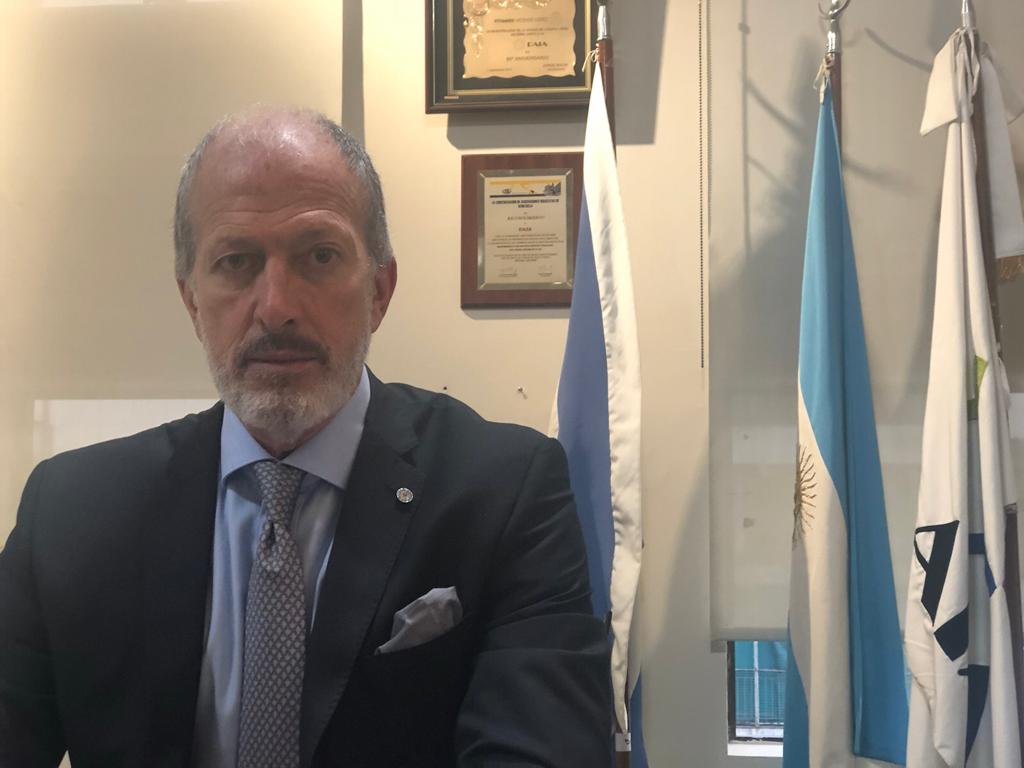
Agencia AJN. – DAIA´s president, Jorge Knoblovits, warned days before the 25th anniversary of the AMIA attack that «the combination of impunity and lack of memory is lethal in Argentina» and stressed that no progress has been made in condemning the brutal terrorist attack because it lacks, at least, «the tools and adequate legislation».
«Since 2012 we have been internationalizing the AMIA case. That’s going to international forums, like the United Nations. As a result of these actions, we are succeeding in having Hezbollah defined as a terrorist organization in the coming days,» Knoblovits said in an interview with Agencia AJN.
However, the head of the of Argentina´s Jewish community political arm wondered: «What will happen when a country like Argentina declares that the Islamic Republic of Iran is a terrorist country? Because relations with Iran have never been broken».
The following are the most important sections of the interview with DAIA´s president.
-AJN: We are just a few days away from a new anniversary of the AMIA-DAIA attack, how does this date find you?
-J.K.: It finds us in the scenery of impunity. The 25th anniversary of impunity in relation to the bombing of the building cannot be analyzed if we do not see what happened two years ago. Twenty-seven years ago, on March 17, 1992, there was another attack in the Argentine Republic, with many deaths, and it is also unpunished. Therefore, the mixture of impunity and lack of memory is lethal in Argentina. So you find me a little sad, but with a lot of strength because we have a series of new tools. Since 2012 we are internationalizing the AMIA cause. That is resorting to international forums, such as the United Nations . As a result of these actions, we are succeeding in having Hezbollah defined as a terrorist organization in the coming days. Hezbollah is Iran, it is the branch that makes attacks outside the Middle East. Iran is accused, its officials are accused. Hezbollah and Iran are exactly the same. So this date finds us disappointed by injustice and impunity, but renewed, because we are not going to stop looking for the proper tools for this to be resolved.
-AJN: Why is an attack as AMIA´s so important abroad?
-J.K: This is not forgotten. Because the saga of terrorism began in Argentina in 1992 and 1994 and was the beginning of global terrorism. Other countries have succeeded with justice and with those responsible. Not us. It hasn’t been properly investigated or we haven’t had the right framework. But what happened in Argentina was the beginning of massive attacks. Twin Towers, Charlie Hebdo, Atocha, London.
-AJN: The AMIA attack is the only one that points to Iran.
-J.K: That’s why the Memorandum was nefarious, because it was the interference of politics in the judicial case. In this scenario, it is certain that there are officials from the Islamic Republic of Iran who have red flags because they are charged. It has not been possible to move forward because we do not have the tools, the legislation. Only today are we determining that Hezbollah is a terrorist organization. What will happen when a country like Argentina declares that the Islamic Republic of Iran is a terrorist country? Because relations with Iran have never been broken. Sometimes I pass through the embassy door and it is still open, it has movement. It’s very unfair.
-AJN: During the recent visit of Senator Miguel Ángel Pichetto, you had a very frank talk about his support to the Memorandum.
-J.K: I like to work on the truth. And even with the truth to have dissent. We can’t stand the agenda of hypocrisy. DAIA is here to leave a mark. We want to leave the mark of coherence. We are guided by coherence and goodwill. We must manifest all dissent. We have dissent with those who come to visit us, from different political movements, we even have dissent with the member organizations of the DAIA. And we have 30 wills within DAIA that do not think the same thing and I often lose the ‘votes’. Sometimes my proposals are not accepted and are surpassed by others much more intelligent. What the president of an organization like DAIA has to do is to lead the dissent and thought of the different.
-AJN: The Government stated that during its administration progress has been made in the AMIA cause. Do you agree?
-J.K.: No. It doesn’t matter if a government says it made progress. Justice has to say it. The last thing that was done in the AMIA case was done by Alberto Nisman. The government did not do it, neither this nor the previous one. Let us highlight the figure of Alberto Nisman. All Governments are at the disposal of the legal tools. But justice should have been the one who advanced. Let us not confuse the governmental agenda or the electoral agenda with the judicial agenda. That’s what happened with the Memorandum.
-AJN: What are your thoughts on Nisman, who worked to make Iran´s terrorism known?
-J.K: Alberto Nisman is in the best of places for DAIA, in the place of the one who put his effort and knowledge into it, put his life into it.
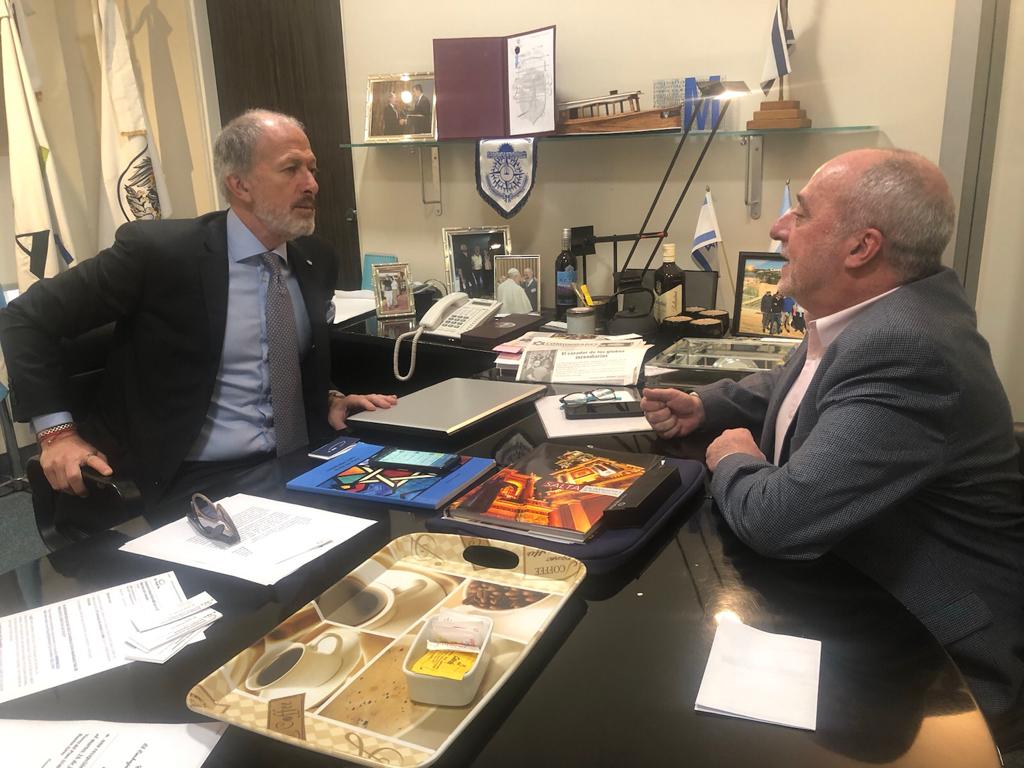
-AJN: There has been talk about the trial in absentia to resolve the AMIA case, Pichetto even said during the visit to DAIA.
-J.K: Senator Pichetto explained it, we say that they are tools of the State, not even of the Government, they transcend governments, this and any other has to be promoted by those who administer justice, neither by DAIA, nor by AMIA.
-AJN: How do you rate this 25th anniversary of the AMIA attack in your first year in office?
-J.K: It puts me in the right place along with the victim´s relatives.
-AJN: Looking to the future, what would be DAIA´s mission in the AMIA cause?
-J.K: I imagine myself chasing those responsible with the right tools. The goal is that those who are known to be guilty be convicted. What I’m not clear about, and I’m going to be absolutely honest, is that I don’t know what the tools are so that those who are guilty can be imprisoned in prisons in Argentina. But what we are doing is seeing that we can find tools together in Argentine society because it is neither DAIA, nor AMIA, nor even family members. We all have to find an adequate solution to this fear that means the absence of justice.
-AJN: Do you have any opinion regarding presidential candidate Alberto Fernández’s latest statements on the Memorandum?
-J.K: We have to look at this national political world with objectivity and each one of them with subjectivity is going to have the right speech to win the elections. I told Senator Pichetto that we had a huge dissent with his position on the Memorandum and we told him publicly because otherwise it doesn’t make any sense to say it. This has to be heard by him and by everyone. The same will apply to Fernández, (José Luis) Espert, (Roberto) Lavagna or any candidate for first senator or head of government or governor of the province of Buenos Aires. We have an agenda. We are going to try to hold our agenda whoever wins and also whoever loses because the two parties govern.
-AJN: How do you describe the relationship with the AMIA?
-J.K: I get along very well with the president because the institutions are very clear about what our concerns are. The DAIA is the one that covers and protects all of them. I have a very good personal relationship with the AMIA´s president and it is not minor. We meet because we take care of ourselves, he takes care of my space and we take care of his.
-AJN: Is there any concern in DAIA at this time?
-J.K: We have decided in the last few weeks that we do not live only from worries. What we do from DAIA is pure political construction of the best and the healthiest. We have constructions, we don’t have any worries.
Argentina
Entrevista con Marcos Aguinis: su nuevo libro y la amenaza del antisemitismo
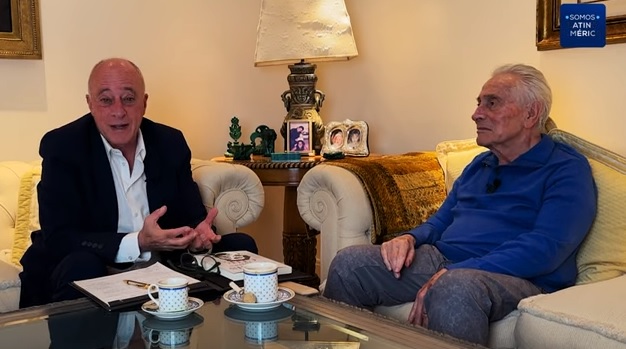
Agencia AJN.- Con sus 90 años, Marcos Aguinis acaba de publicar “Intimidades del Che”, una obra de ficción que explora la vida de Ernesto “Che” Guevara. En el marco de un ciclo de entrevistas conducido por Daniel Berliner, director de la Agencia AJN, el escritor reflexionó sobre su nuevo trabajo y sobre fuerte aumento del antisemitismo a nivel mundial.
“El 7 de octubre es un acontecimiento muy reciente. Y que aparentemente era imposible que ocurriera. Uno tiene que pensar que lo fundamental es que los judíos no nos convirtamos en fanáticos. Que no imitemos a nuestros enemigos. Y odian a Israel sin saber qué son los judíos. A muchos antisemitas se les pregunta ¿usted sabe dónde queda el río Jordán? Ni idea, responden. Nos encontramos con una fuerte ignorancia a la que tenemos que enfrentar mediante la paz, el diálogo, que lleve a que este enfrentamiento desaparezca. Al desaparecer este motivo de odio, desaparecerán otros motivos de odio”, destacó Aguinis.
“Es más fácil odiar que amar, y esto tiene que ser combatido. Y es combatido por las mentes más lúcidas. El antisemitismo que ahora se propaga en las universidades es algo que tiene poco a poco producir la vergüenza de los universitarios. No saben qué odian”, agregó.
La entrevista fue transmitida por Dnews en el ciclo “Diálogos”, una entrega semanal que propone un espacio de conversación inteligente, plural y comprometido con la actualidad.
En cada emisión, personalidades relevantes del ámbito político, social, cultural y comunitario se sientan a dialogar sobre los temas que marcan la agenda nacional e internacional.
“Hace unos años Jorge Fernández Díaz me tituló a mí ‘hombre del renacimiento’, porque quedó impresionado por la cantidad de actividad que hago. Según él, eso me hermanaba con la gente del renacimiento, que tenía varias profesiones y en todas ellas tuvo algún tipo de brillo”, expresó Aguinis al principio de la entrevista.
Para ver el programa completo:
Argentina
Rafael Grossi: “El conflicto entre Israel e Irán está tomando una dimensión mucho más amplia”
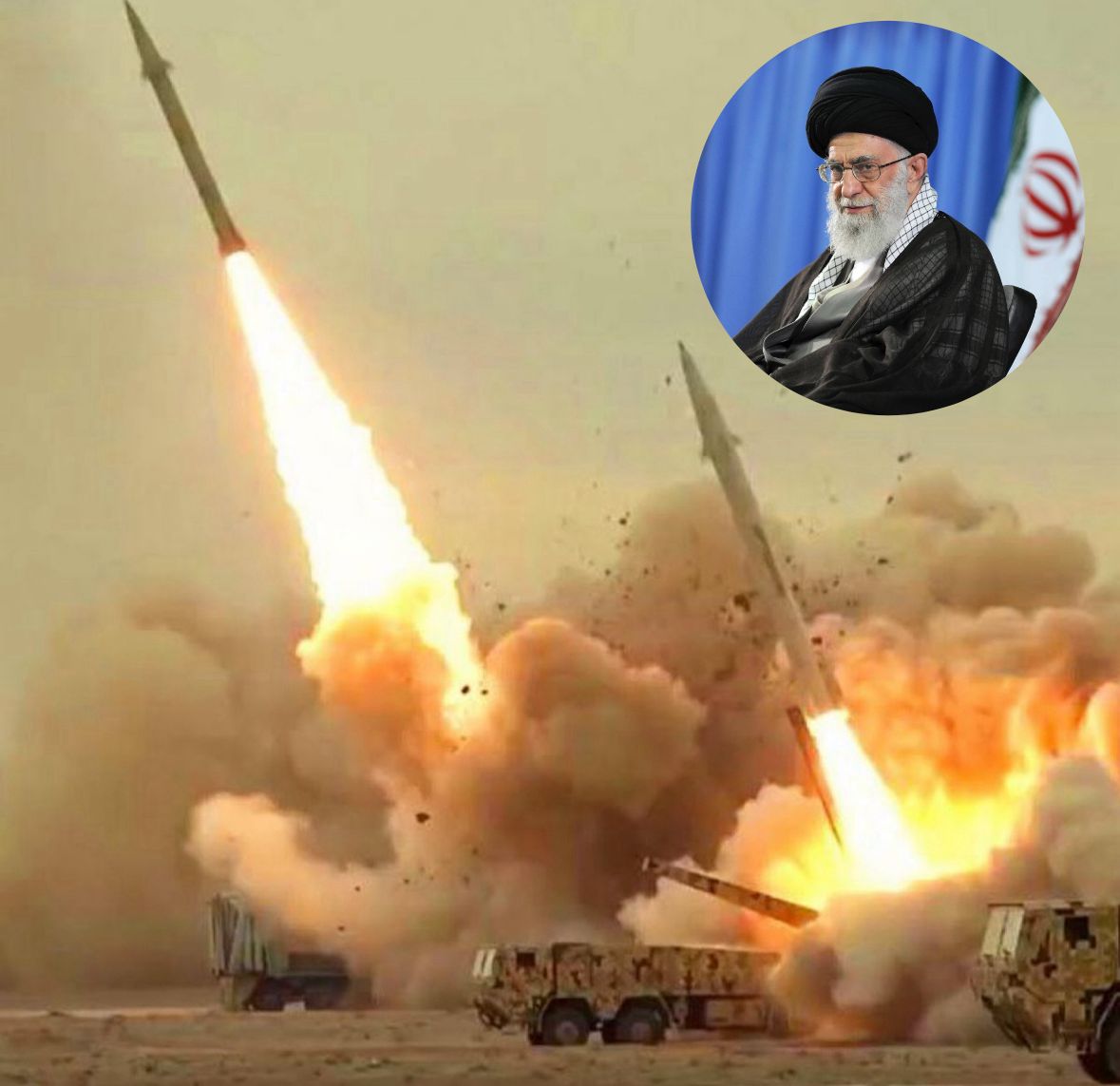
Agencia AJN.- El director general del Organismo Internacional de Energía Atómica (OIEA), Rafael Grossi, destacó que los ataques israelíes “en un primer momento fueron orientados exclusivamente a ciertas instalaciones nucleares y ahora el conflicto está tomando una dimensión mucho más amplia, incluyendo otros objetivos que no son nucleares”.
“La historia ha tomado un giro más dramático a partir del momento en que Israel, la semana pasada, inició una serie de ataques, que en un primer momento fueron orientados exclusivamente a ciertas instalaciones nucleares y ahora el conflicto está tomando una dimensión mucho más amplia, incluyendo otros objetivos que no son nucleares. La parte nuestra obviamente tiene que ver con las instalaciones nucleares y por eso ha habido una serie de reuniones en la Junta de Gobernadores del OIEA. El día viernes estuve hablando al Consejo de Seguridad de las Naciones Unidas para informar a todos los países acerca de la situación y cuáles son los peligros que pueden derivarse”, afirmó Grossi en diálogo con el periodista Eduardo Feinmann en Radio Mitre.
-¿Hay riesgo químico cuando un misil ataca a una de estas plantas nucleares?
-Hay un riesgo nuclear en primer lugar, aunque también puede haber un riesgo químico. Trato de diferenciar las dos cosas. Hay distintas instalaciones. En estas instalaciones que tienen distintas funciones, algunas son para enriquecimiento de uranio, otras son para fabricación de combustible, otros son laboratorios. Y en esos lugares entonces lógicamente hay material nuclear. Si el material nuclear, a raíz de una explosión o del impacto de un proyectil de distinta naturaleza, es liberado al medio ambiente, puede haber entonces un impacto ambiental, como radiación en la atmósfera. Esto es lo que se está tratando de determinar. Por el momento, han sido muy graves, pero si usted quiere que nos detengamos en la cuestión de la radiación, han tenido un efecto muy limitado en ese aspecto, y no me refiero al impacto o a la destrucción que han causado, se han limitado a instalaciones que tenían una cantidad relativamente limitada de material nuclear y por eso la contaminación ha sido muy limitada al lugar donde se produjo el impacto. Esto es obviamente por el momento.
-¿Usted está al tanto de una planta nuclear que está bajo tierra que tienen los iraníes y que podría llegar a ser bombardeada por Trump?
-Sí, claro, la inspeccionamos, yo la he visitado particularmente. Hay fundamentalmente dos instalaciones en las que Irán justamente ha puesto material y equipo nuclear bajo tierra a raíz de ataques anteriores que han habido en Irán, de tipo sabotaje, nunca atribuidos a ningún país. Pero el hecho es que Irán había sufrido ya en alguna de sus instalaciones sabotajes internos o ataques con drones, entonces en ese momento los iraníes decidieron, hace dos o tres años, comenzar a poner bajo tierra ciertos equipos e instalaciones.
-Para la bomba atómica, la clave está en el uranio enriquecido. ¿A qué porcentaje ya lo tenían o lo tienen preparado los iraníes?
– Para tener un arma nuclear hace falta uranio enriquecido, también puede ser plutonio, pero en el caso de Irán, lo que ellos han estado acumulando es uranio enriquecido. El uranio tiene que estar enriquecido a un grado de 90% de un isotopo, que es una variedad de la partícula de uranio, al 90%, y ellos están acumulando al 60%. No han llegado a acumular al 90%, pero de querer hacerlo es un pasito más. Ellos tienen el material, y ese material sería suficiente para 6, 7, 8 armas nucleares, pero esto no quiere decir que tengan hoy un arma nuclear.
-Israel y Estados Unidos denuncian que estaban a punto de tener 15, y entonces hicieron ese ataque preventivo para que no las terminen de fabricar.
-Eso es lo que dicen ellos, correcto. Lo que nosotros decimos, es que es inquietante esto, lo hemos informado, hemos inclusive, tenido una evaluación bastante crítica con relación a la manera en que Irán nos respondía o nos daba información necesaria sobre este tema, que ha sido bastante fragmentaria, pero no podemos decir que hoy tenga un arma nuclear. Para eso hace falta más material.
-¿Esto usted lo habló con Trump y con Netanyahu?
-No directamente con ellos, pero con gente muy cercana a ellos, sí, muy cercana.
-¿Y usted cuando los iraníes, el Ayatolá o quien sea, le cuentan lo que tienen, usted les cree?
-En cuanto a lo que tienen, nosotros sabemos lo que tienen, el tema es lo que tienen y no sabemos. O lo que no informan, esto lo he estado denunciando mucho y hace tiempo en el sentido que Irán, siempre decían o dicen que ellos no tienen nada que ocultar. Entonces nosotros, como Organismo Internacional de Energía Atómica, les decimos a ellos, si no tienen nada que ocultar, entonces tienen que mostrarnos mucho más. Ellos siempre han evadido un poco esto y bueno, estamos en esta situación en la que estamos.
-
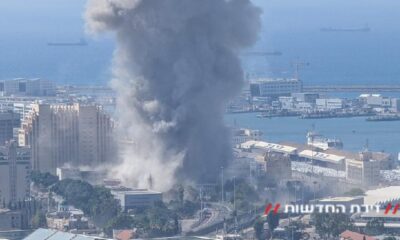
 Israelhace 16 horas
Israelhace 16 horasIsrael: 17 heridos, dos de ellos graves, tras impacto de misil balístico iraní en Haifa
-
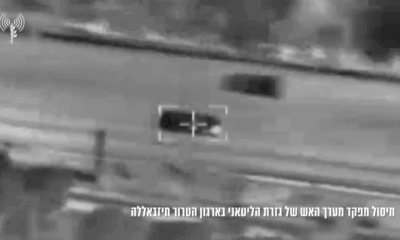
 Medio Orientehace 16 horas
Medio Orientehace 16 horasEliminado en el sur del Líbano el comandante de artillería de Hezbollah responsable de ataques contra Naharía y Haifa
-
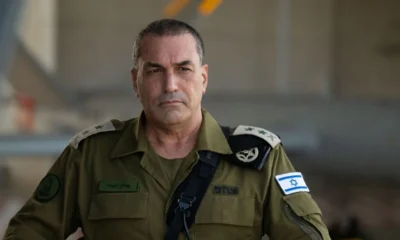
 Israelhace 11 horas
Israelhace 11 horasEl jefe de las FDI insinúa una guerra prolongada: «Lanzamos esta campaña para eliminar la amenaza»
-

 Israelhace 18 horas
Israelhace 18 horasNetanyahu y el jefe del Estado Mayor de las IDF se reúnen con altos funcionarios de EE. UU. mientras Trump evalúa atacar Irán
-
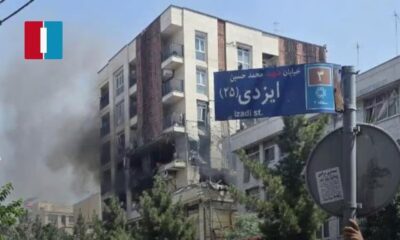
 Medio Orientehace 17 horas
Medio Orientehace 17 horasInforme: Ataque con drones en Teherán habría tenido como objetivo a científico iraní especializado en armamento
-
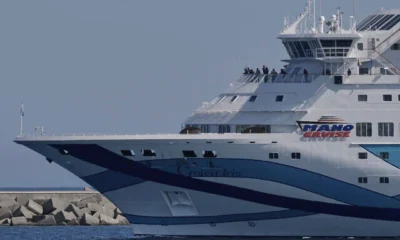
 Israelhace 18 horas
Israelhace 18 horasLa aerolínea israelí El Al ofrece a sus clientes la opción de regresar a Israel desde Chipre en crucero
-
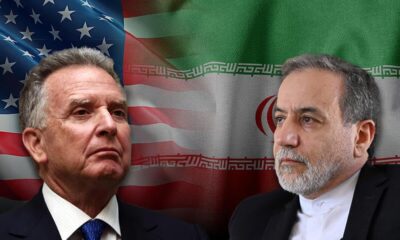
 Medio Orientehace 12 horas
Medio Orientehace 12 horasIrán rechaza negociaciones con Estados Unidos mientras continúen los ataques israelíes
-
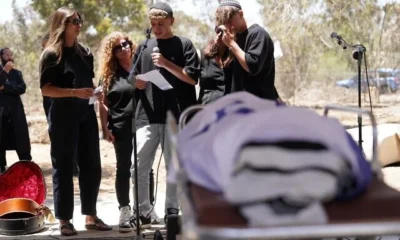
 Israelhace 18 horas
Israelhace 18 horasEmotivo entierro en Kibutz Nir Oz: Despiden a Yair Yaakov, rehén asesinado el 7 de octubre


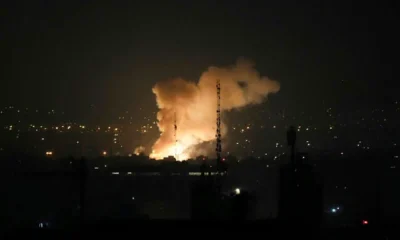

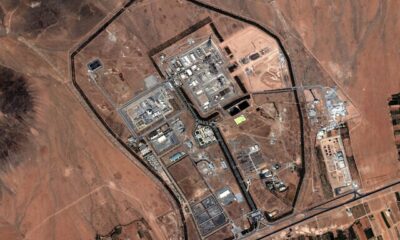

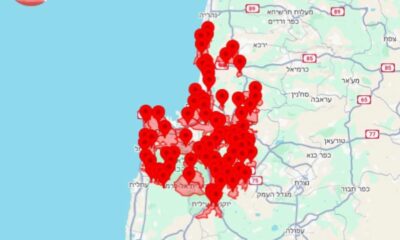

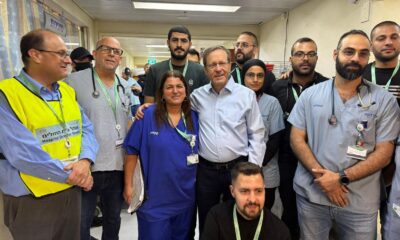

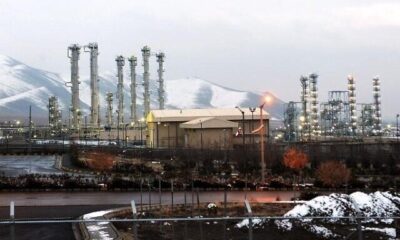

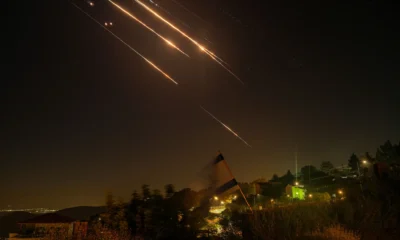


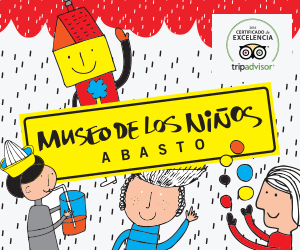
 Suscribite al Whatsapp!
Suscribite al Whatsapp!